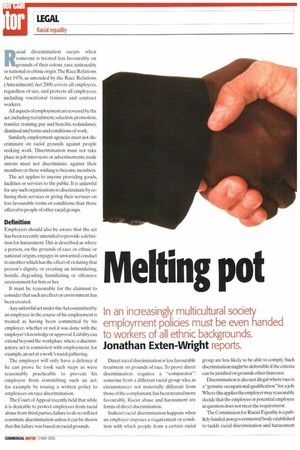R gr acial discrimination occurs when someone is treated less favourably on
Page 38

If you've noticed an error in this article please click here to report it so we can fix it.
ounds of their colour, race, nationality or national or ethnic origin.The Race Relations Act 1976, as amended by the Race Relations (Amendment) Act 2000, covers all employers, regardless of size, and protects all employees, including vocational trainees and contract workers.
All aspects of employment are covered by the act, including recruitment,selection,promotion. transfer, training, pay and benefits, redundancy, dismissal and terms and conditions of work.
Similarly, employment agencies must not discriminate on racial grounds against people seeking work. Discrimination must not take place in job interviews or advertisements; trade unions must not discriminate against their members or those wishing to become members.
The act applies to anyone providing goods, facilities or services to the public. It is unlawful for any such organisations to discriminate by refusing their services or giving their services on less favourable terms or conditions than those offered to people of other racial groups.
Definition
Employers should also be aware that the act has been recently amended to provide a definition for harassment. This is described as where a person, on the grounds of race or ethnic or national origins, engages in unwanted conduct to another which has the effect of violating that person's dignity, or creating an intimidating, hostile, degrading, humiliating or offensive environment for him or her.
It must be reasonable for the claimant to consider that such an effect or environment has been created.
Any unlawful act under the Act conunitted by an employee in the course of his employment is treated as having been committed by his employer, whether or not it was done with the employer's knowledge or approval. Liability can extend beyond the workplace where a discriminatory act is connected with employment; for example, an act at a work's social gathering.
The employer will only have a defence if he can prove he took such steps as were reasonably practicable to prevent his employee from committing such an act; for example by issuing a written policy to employees on race discrimination.
The Court of Appeal recently held that while it is desirable to protect employees from racial abuse from third parties,failure to do so will not constitute discrimination unless it can be shown that this failure was based on racial grounds.






































































































































































































